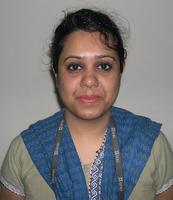What is good about the monitoring system that we are using is that it is participatory so that respondents also get knowledge", says Senior Sector Specialist Water, Sanitation and Hygiene Mahjabeen Ahmed of the BRAC WASH II Programme.
Published on: 26/02/2013

Mahjabeen Ahmed
Armed with smart phones, 30 teams consisting of one male and one female staff member have been collecting WASH data in sample areas of the BRAC WASH programme. Each team gets 6 days training in QIS – the Qualitative Information System, a participatory method for capturing and quantifying respondents' situation regarding WASH issues. The BRAC monitoring teams visit households, village WASH committees, schools and rural sanitation centres.
QIS uses a 0 to 4 scoring system, in which 0 means the desired situation is non-existent, 2 is the benchmark indicating that all programme expectations have been met, and 4 is the ideal situation. "With QIS you learn how to question to get the real situation" says Ms. Ahmed. "QIS scoring is done by observation of proof, you need for example to see a register to monitor the village WASH committees", she explains.
"It has been a large learning experience for me", Ms Ahmed reveals. "Things that are important, but usually unnoticed, are more easily identified". As an example, she mentions knowledge of what happens to sludge and people's attitudes about it. Are latrines being used by all household members or not? This kind of knowledge would have been more difficult to capture by other monitoring systems, according to Ms. Ahmed.
The participatory nature of QIS means that respondents also benefit, according to Ms Ahmed. "It raises awareness about their situation, where they are now and where they should be".
Analysis of the monitoring data is now underway.
More on the BRAC WASH II programme is available on both the IRC website and the BRAC website. Participatory monitoring features briefly as one of the activities in a new promotional video about the BRAC WASH programme.
At IRC we have strong opinions and we value honest and frank discussion, so you won't be surprised to hear that not all the opinions on this site represent our official policy.